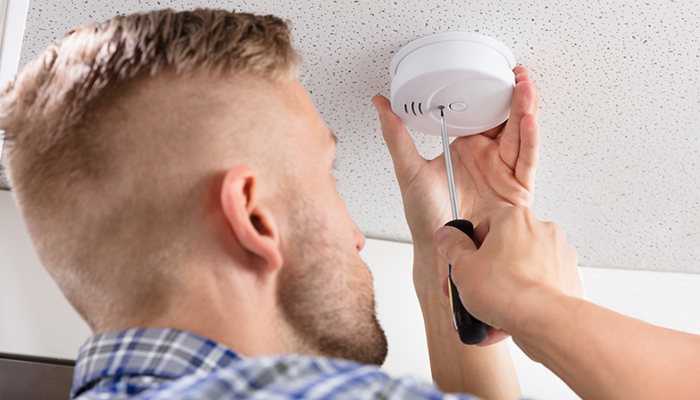By law, every landlord that owns a House in Multiple Occupation (HMO) property in England or Wales has certain responsibilities that they must adhere to. The laws are there to ensure that tenants have a property that is safe, but they also ensure that property owners are protected too. Landlords must ensure they meet the strict legal criteria that are expected of them.

Andrey_Popov / Shutterstock.com
There is a lot to consider, but the reason someone might own an HMO property is to maximise their investment and run their rental portfolio in a more efficient way.
What is an HMO and when do you need an HMO Licence?
An HMO is a property that has more than three tenants who do not belong to the same household. Traditionally, old properties have been converted so that the bedrooms are let by individual tenants, making each unit separate -that allows landlords to charge rent per room.
It is important that landlords also obtain the correct licence. If their property is occupied by five or more people, then they must apply for an HMO licence. The average standard fee for an HMO licence is around £650-£700.
HMO Landlords and their legal responsibilities
Room sizes – HMO landlords must make sure that the room sizes meet regulations:
- 4.64 square metres for a child under 10 years old
- 6.51 square metres for a person aged 10 or over
- 10.22 square metres for 2 people aged 10 or over
Gas safety checks – all landlords are required to ensure that all gas appliances, as well as all associated pipework, are in a safe condition. An annual inspection carried out by a gas safe registered engineer, who will then issue a Gas Safety Certificate, is required.
Electrical installation condition report – every five years, landlords are expected to arrange an electrical installation condition inspection. The inspection report should be stored because the local authority can request it at any time – you will then need to produce it within seven days.
In addition to this, all sockets, plugs and adaptors must comply with regulations, so that tenants are not exposed to the risk of electric shocks.
Legionella risk assessment – Legionella risk assessments have to be carried out on an annual basis. Unlike single lets, the risk of legionella is higher in HMOs. The results from the assessments have to be kept for five years.
Fire safety – HMOs have a higher risk of fire and that means that landlords are expected to implement all necessary measures such as smoke and fire alarms, escape routes and other measures to mitigate the risks.
Waste management – tenants have to be given access to the correct number of bins to suit the number of tenants residing in the property. Landlords are also expected to provide waste storage facilities that meet the refuse and recycling guidelines provided by the local authority.
Kitchen and bathroom facilities – it is vital that tenants are given access to cooking and washing facilities that are considered suitable for the number of tenants.
Furniture and furnishings – HMO properties do not have to be legally furnished but there is an expectation that they are. Therefore, furniture packages can make life easier. However, all furniture must meet fire resistance regulations. Fully furnished rooms are highly desirable to tenants.
Maintenance and repairs – landlords are also responsible for carrying out repairs to shared areas, as well as heating systems, electrical systems, water and gas pipes, and the exterior of the property such as window frames, the structure or walls if a tenancy agreement is in place. In addition to this, all communal areas should be kept in a presentable condition that is clean and habitable. All maintenance and repairs should be carried out to ensure that the property is safe and fit for habitation.
Council Tax – it is also the responsibility of landlords to cover the cost of council tax as well as utilities, the television licence, Internet and phone.
What aren’t landlords responsible for?
While landlords have many different responsibilities, they are not legally obliged to get involved if there is a dispute between tenants.
If you are considering becoming an HMO landlord, these guidelines are all governed by law, so you will need to make sure you comply or you could find yourself facing a fine of as much as £5,000 per offence.
